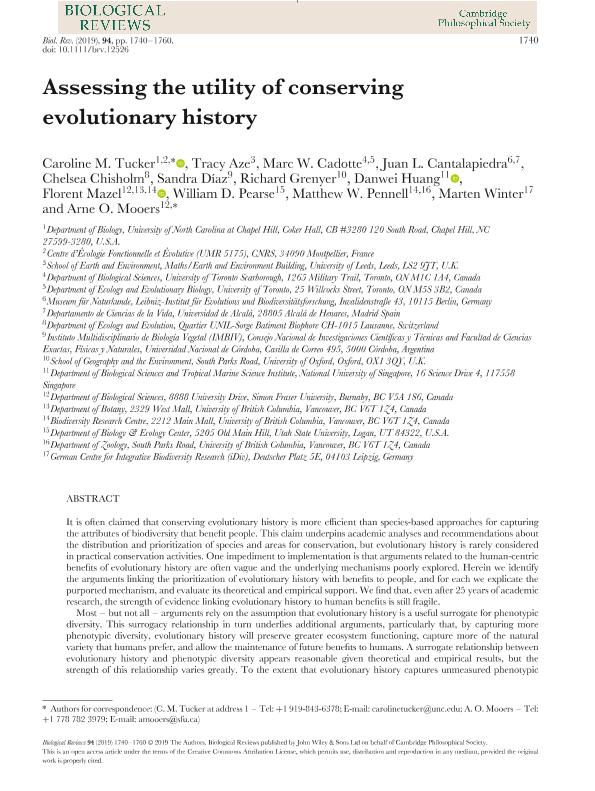Artículo
Assessing the utility of conserving evolutionary history
Tucker, Caroline M.; Aze, Tracy; Cadotte, Marc W.; Cantalapiedra, Juan L.; Chisholm, Chelsea; Díaz, Sandra Myrna ; Grenyer, Richard; Huang, Danwei; Mazel, Florent; Pearse, William D.; Pennell, Matthew W.; Winter, Marten; Mooers, Arne O.
; Grenyer, Richard; Huang, Danwei; Mazel, Florent; Pearse, William D.; Pennell, Matthew W.; Winter, Marten; Mooers, Arne O.
 ; Grenyer, Richard; Huang, Danwei; Mazel, Florent; Pearse, William D.; Pennell, Matthew W.; Winter, Marten; Mooers, Arne O.
; Grenyer, Richard; Huang, Danwei; Mazel, Florent; Pearse, William D.; Pennell, Matthew W.; Winter, Marten; Mooers, Arne O.
Fecha de publicación:
10/2019
Editorial:
Wiley Blackwell Publishing, Inc
Revista:
Biological Reviews
ISSN:
1464-7931
e-ISSN:
1469-185X
Idioma:
Inglés
Tipo de recurso:
Artículo publicado
Clasificación temática:
Resumen
It is often claimed that conserving evolutionary history is more efficient than species-based approaches for capturing the attributes of biodiversity that benefit people. This claim underpins academic analyses and recommendations about the distribution and prioritization of species and areas for conservation, but evolutionary history is rarely considered in practical conservation activities. One impediment to implementation is that arguments related to the human-centric benefits of evolutionary history are often vague and the underlying mechanisms poorly explored. Herein we identify the arguments linking the prioritization of evolutionary history with benefits to people, and for each we explicate the purported mechanism, and evaluate its theoretical and empirical support. We find that, even after 25 years of academic research, the strength of evidence linking evolutionary history to human benefits is still fragile. Most – but not all – arguments rely on the assumption that evolutionary history is a useful surrogate for phenotypic diversity. This surrogacy relationship in turn underlies additional arguments, particularly that, by capturing more phenotypic diversity, evolutionary history will preserve greater ecosystem functioning, capture more of the natural variety that humans prefer, and allow the maintenance of future benefits to humans. A surrogate relationship between evolutionary history and phenotypic diversity appears reasonable given theoretical and empirical results, but the strength of this relationship varies greatly. To the extent that evolutionary history captures unmeasured phenotypic diversity, maximizing the representation of evolutionary history should capture variation in species characteristics that are otherwise unknown, supporting some of the existing arguments. However, there is great variation in the strength and availability of evidence for benefits associated with protecting phenotypic diversity. There are many studies finding positive biodiversity–ecosystem functioning relationships, but little work exists on the maintenance of future benefits or the degree to which humans prefer sets of species with high phenotypic diversity or evolutionary history. Although several arguments link the protection of evolutionary history directly with the reduction of extinction rates, and with the production of relatively greater future biodiversity via increased adaptation or diversification, there are few direct tests. Several of these putative benefits have mismatches between the relevant spatial scales for conservation actions and the spatial scales at which benefits to humans are realized. It will be important for future work to fill in some of these gaps through direct tests of the arguments we define here.
Archivos asociados
Licencia
Identificadores
Colecciones
Articulos(IMBIV)
Articulos de INST.MULTIDISCIPL.DE BIOLOGIA VEGETAL (P)
Articulos de INST.MULTIDISCIPL.DE BIOLOGIA VEGETAL (P)
Citación
Tucker, Caroline M.; Aze, Tracy; Cadotte, Marc W.; Cantalapiedra, Juan L.; Chisholm, Chelsea; et al.; Assessing the utility of conserving evolutionary history; Wiley Blackwell Publishing, Inc; Biological Reviews; 94; 5; 10-2019; 1740-1760
Compartir
Altmétricas



